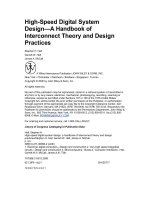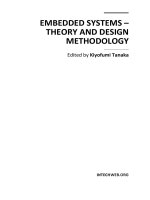Organization theory and design: Lecture 43
Bạn đang xem bản rút gọn của tài liệu. Xem và tải ngay bản đầy đủ của tài liệu tại đây (25.53 KB, 9 trang )
Structural Design for Global
Operations
43
1
Model for Global vs. Local
Opportunities
• The dilemma facing the international
organizations is when to use a
globalization rather than a multi domestic
strategy.
• GLOBALIZATION strategy means that
product design and advertising strategy
are standardized throughout the world
– example of Japanese companies as
compared to US and Canada
2
Model for Global vs. Local
Opportunities
• A MULTI DOMESTIC strategy means that
competition in each country is handled
independently of competition in other
countries. It would encourage product
design, assembly and marketing tailored
to the specific needs of each country.
– French don’t drink orange juice in breakfast
and laundry detergent is used to wash dishes
in Mexico
3
Model to Fit Structure to
International Advantages
Forces for Global Integration
Hi
Globalization
global product str
Low Export strg
Intl Div
Glob+MD
Glob matrix
MD strg
Glob geo stru
FORCES FOR NATIONAL RESPONSIVENESS
4
Transnational Model
•
•
•
1.
2.
3.
4.
This model of organization structure goes beyond the global matrix
structure to apply the concept of the learning organization to a huge,
international corporation.
It is the most recent thinking about the kind of structure needed by
complex organizations.
This model cannot be given a precise definition but the following elements
distinguish it from and move it beyond a matrix structure:
TN model differentiates into many centers of different kinds: “flexible
centralization” and not one HQ like matrix
Subsidiary managers initiates strategy and innovations that become
strategy for the corporation as a whole. (bottom-up approach in strategy
making)
Unification and coordination are achieved through corporate culture,
shared vision and values, and management style rather than through the
vertical hierarchy.
Alliances are established with other company parts and with other
companies.
5
Trend Towards Empowerment
•
EMPOWERMENT is the notion of giving
employees the power, freedom, and
information to make decisions and
participate fully in the organization.
6
Trend Towards Empowerment
WHY FIRMS ADOPT EMPOWERMENT?
1. As a strategy to improve products or
services
2. Because other firms in their industry are
doing the same
3. To create a unique Learning organization
with superior performance capabilities.
7
Trend Towards Empowerment
•
•
Power in organizations is not a zero sum
game
Empowerment increases the total power
in an organization
8
Elements of Empowerment
•
1.
2.
3.
4.
Empowering employees means giving them
four elements that enable them to act more
freely and accomplish their jobs.
Employees receive INFORMATION about
company performance
Employees have KNOWLEDGE and skills to
contribute to company goals
Employees have the POWER to make
important decisions
Employees are REWARDED based on
company performance
9









